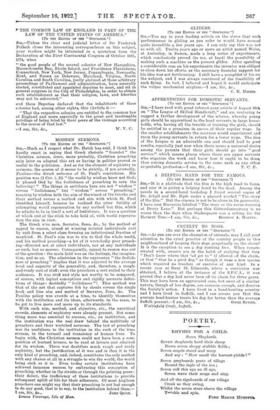MODERN SERMONS.
[TO THE EDITOR OF THE " SPECTLTOR."1
Sia,—Much as I respect what Dr. Hatch has said, I think him hardly exact in saying that Greek rhetoric " founded " the
Christian sermon, since, more probably, Christian preaching only later on adopted this art as having in politics proved so useful to the politician. And as for the element of sophistry in sermons, the source of it seems to be strictly, if not avowedly, Pauline—the direct outcome of St. Paul's convictions. His position was (1 Cor. i. 21) "the world by wisdom knew not God; it pleased God by the foolishness of preaching to save the
believing I " The things in antithesis here are not " wisdom " versus " foolishness," but " wisdom " versus " preaching,"
meaning by wisdom both the aim of the wisest of the Greeks and
their method versus a method and aim with which St. Paul identified himself, because he realized the utter futility of
attempting world regeneration by any method but this, which he admits to be in itself a sort of foolishness. It was a question of which end of the stick to take hold of, with world regenera- tion the aim in view.
The Greek wise men, Socrates, Zeno, &c., by the method of appeal to reason, aimed at winning isolated individuals unit
by unit from a select class forming an infinitesimal fraction of
mankind. St. Paul's aim was to win to God the whole world, and his method preaching—a lot of it wretchedly poor preach- ing—directed not at select individuals, nor at any individuals as such, but as masses. Consequently, appeal to reason was out of the question : the main hold was on the feelings, the imagina- tion, and so on. The admission in the expression " the foolish- ness of preaching" implies that it was adjusted to the average level and capacity of the generality, and, therefore, a rough- and-ready sort of stuff; even the preachers a sort suited to their audiences. It was stuff and style not worthy to be compared, of course, with logical conceptions and rigidly accurate defini- tions of things : decidedly " foolishness " This method was
that of the net that captures fish by shoals versus the single hook and line aim and method of Socrates, Zeno, &c. The
Pauline policy was crowds at a time, to identify themselves with the institution and its ideas, afterwards, in the mass, to be got to live more and more up to its standards.
With such aim, method, and objective, viz., the uncritical crowds, elements of sophistry were already present. But some-
thing more was essential to success, viz., an institution, and
the institution was the real draw behind the multitude of preachers and their wretched sermons. The test of preaching
was its usefulness to the institution in the rush of the time stream, in the turmoil and transiency of human lives. To begin with, the Christian sermon could not have been a com- position of learned leisure, to be read at leisure and admired
for its wisdom. There was doubtless much rough and ready sophistry, but the justification of it was and is that it is the only kind of preaching, and, indeed, constitutes the only method with any chance at all in a struggle to win the world, the world being such as it is. Even to-day certain institutions have achieved immense success by embracing this conception of preaching, whether in the streets or through the printing press : their defect, the inefficiency of these institutions to provide subsequent uplift of life for their adherents. Of most Anglican
preachers one might say that their preaching is not bad enough to do any good, that is to say, to the institution behind them.— I am, Sir, Lc., JOHN Qum& Lonan Vicarage, Isle of Man.


































 Previous page
Previous page